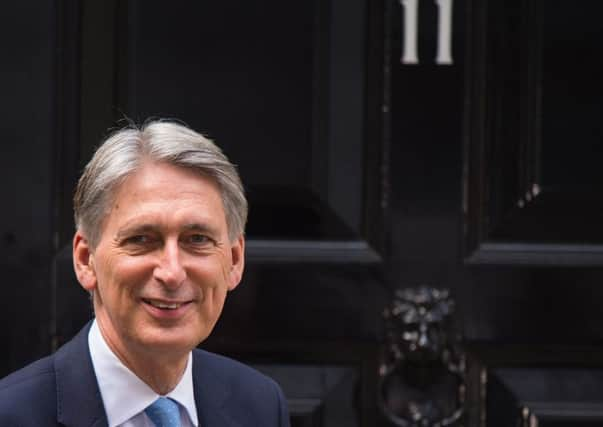Greg Wright: Let the Bank regulate our financial services sector


Anybody with an ounce of common sense will have cheered the Commons Treasury Select Committee, which concluded that we need a new banking watchdog to stop the financial crash of 2008 from happening again.
Nobody can doubt that there was wholesale regulatory failure in the run up to the crisis, which condemned the UK economy to years of misery and under-achievement. The after-shocks are still being felt today.
Advertisement
Hide AdAdvertisement
Hide AdSo can we expect to see firm, decisive action from the Government to keep the unruly elements of the financial services sector in check?
I wouldn’t hold your breath.
Previous watchdogs have displayed a reluctance to sink their teeth into wrongdoers.
But the MPs, with more than a hint of exasperation, believe there’s a case for one last big push.
The chairman of the Commons Treasury Select Committee, Andrew Tyrie, is urging Chancellor Philip Hammond to create a new body that would throw the book at badly-run banks.
Advertisement
Hide AdAdvertisement
Hide AdCommenting after the publication of a report, which analysed the collapse of HBOS and the dire performance of the banking regulators, Mr Tyrie said: “The regulators failed both before and after the HBOS crisis.
“Seven years after the bank’s collapse, we now know just how badly. It took persistent pressure from the Treasury Select Committee to ensure these failures weren’t swept under the carpet.”
You may struggle to remember the Financial Services Authority (FSA); the regulator that was supposed to prevent crises like the implosion of HBOS.
The lacklustre performance of the regulators in the run up to the crash was memorably lampooned by Sebastian Faulks in his novel, A Week in December.
Advertisement
Hide AdAdvertisement
Hide AdIn the novel, John Veals, an amoral hedge fund owner, runs rings around hapless officials who can never quite work out that he’s plotting to destroy a big bank.
The FSA was swept away after heavy criticism of its performance in the run- up to the banking crisis, and replaced in 2013 by the Financial Conduct Authority (FCA) and the Prudential Regulation Authority (PRA), which is part of the Bank of England.
The FCA came under the spotlight last year when its chief executive, Martin Wheatley, was ousted by David Cameron’s government after complaints that Wheatley was taking too hard a line with some financial services firms.
It’s hard to see how Wheatley could have maintained any credibility without giving the big players a very hard time.
Advertisement
Hide AdAdvertisement
Hide AdThe British consumer has endured decades of scandals linked to mis-selling by financial firms, with misconduct covering pretty much every form of financial activity.
Mr Tyrie believes the regulators must display greater vigilance and energy if they are to win public backing.
The committee argues the FCA’s enforcement arm should be placed into a new organisation, which, at long last, would keep the banks on their toes and ensure they don’t bring the economic house down.
The Treasury’s response was predictable, and depressing. A spokesman said the sector had been reformed, and steps had already been taken to address the failings highlighted in the report.
Advertisement
Hide AdAdvertisement
Hide AdTwo years ago, the Government concluded that a separate enforcement body was not appropriate.
So the most likely outcome from the MPs’ exhaustive study is no change whatsoever. Our financial life is in the hands of a regulatory regime which many believe to be flawed.
This is simply not good enough. We desperately need an assertive regulator, with no conflicts of interest, who will kick the tyres of all the major banks and ensure they are not lending recklessly, or selling people complex financial products with hidden snares.
I’d tear the whole regulatory structure up and place the solution in the hands of the Bank of England. The Bank did a pretty good job of keeping the economy on the straight and narrow for a very long time. It has more gravitas than any of the other regulatory bodies that have emerged in the last two decades.
Advertisement
Hide AdAdvertisement
Hide AdThe Bank, under the brisk, no- nonsense leadership of Mark Carney, would have the sole job of policing the financial services sector, so there would be no doubts about where the buck stops.
There would be less chance of miscreants slipping between the cracks. Public confidence in financial services would be boosted, and global markets would see we were finally getting a grip.
This would be in keeping with plans outlined by the Government last year, which aimed to further centralise financial regulation at the Bank.
This was certainly the most sensible proposal suggested by Cameron’s short-lived Tory government.
Advertisement
Hide AdAdvertisement
Hide AdIf the new Government wants to take giant strides towards fiscal credibility, it must allow the Old Lady of Threadneedle Street to pack a real regulatory punch.
Greg Wright is the deputy business editor of The Yorkshire Post.